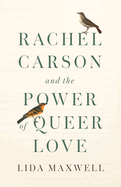
For most people, Rachel Carson is synonymous with her Silent Spring exposé of unregulated chemicals destroying the sustainability of American agriculture. In Rachel Carson and the Power of Queer Love, Boston University professor Lida Maxwell examines letters Carson exchanged with her intimate friend Dorothy Freeman and argues that Carson's environmentalism was inextricably intertwined with queer frameworks of love.
Maxwell draws on writers from many disciplines, including Black and queer studies, to elucidate how structures commonly thought of as inherent to human desire and relationships are shaped by white patriarchal capitalism. She demonstrates that ideologies of heteronormative love are based on self-shaming to distance oneself from supposed deviances, lack of utility in an ideal of love for its own sake, and separation between the political and the intimate. In the queer relationship Carson developed with Freeman during their time on Southport Island in Maine, these ideals of straight love are inverted. Unlike heteronormative ideas of naturally occurring love without purpose, Carson and Freeman are active creators of their love, which is a source and result of wonder rather than shame, characterized by "loving use" rather than the "using up" of capitalist consumption, and vital to Carson's commitment to nonhuman nature and political activism.
Maxwell brilliantly evokes emotions while making intellectual arguments, telling the story of Carson and Freeman's developing love through passionate excerpts from their letters and gorgeous descriptions of the land that served as the backdrop and companion to their love. Readers of all sexualities stand to gain tremendously from her work in every area of their lives. --Dainy Bernstein, freelance reviewer

